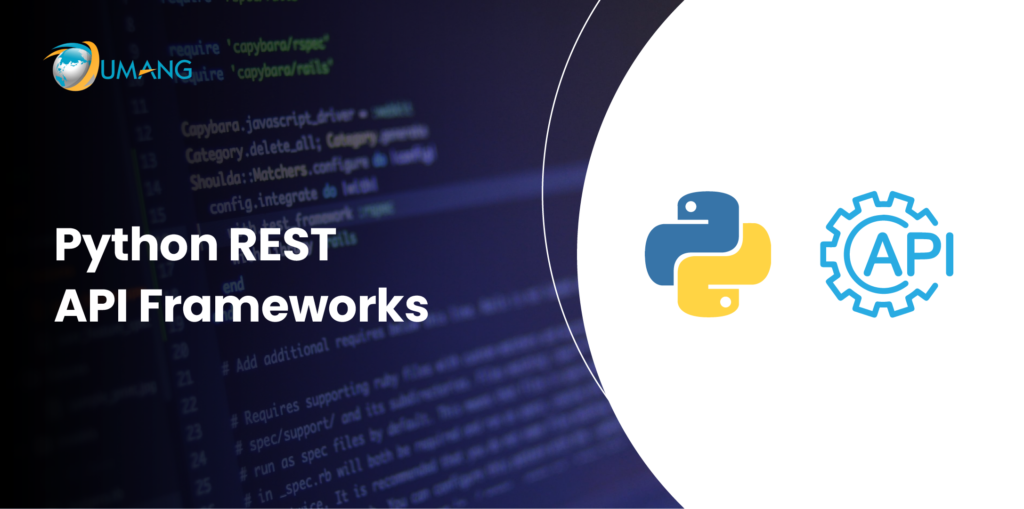Are you planning to build an API with Python? If yes, then let’s discover How!
Python is the most versatile programming language. The language has a large community user base due to its readability, ease of learning, and less complicated syntax. For the past few decades, Python has been used in multiple domains to build multiple applications.
The application user interfaces access data or functionality over the internet. Thus, an API makes it easier for developers to use specific technologies to build applications using predefined operations. Thankfully, there are particular Python frameworks, but they are not meant to be APIs.
So, together we explore some popular Python REST API frameworks to develop APIs.

Top Python REST API Framework
Currently, numerous frameworks are available that make the development task easier for developers.
1. Django
Django is a full–stack and complete–featured framework of Python. It is almost the old but popular web framework with 50K stars on GitHub. The framework brings various features that enable developers to build capable web applications. However, other than HTTP and application middleware, it has further potential, like data views and MVC patterns, templates, caching, security, database management, and many more.
The developers can easily install the Python pip package manager, which is installed within a single command.
Features
- Extensive and good documentation to refer to and learn
- Web browser API has extensive usability for developers
- Support automatic URL routing to Django
- Requires less coding to build even complex API.
2. Flask
As its name says, Flask REST is tailor-made and used to make the API development process simple and smooth. This Python structure requires only a few commands to run smoothly and create APIs. Flask’s simple and easy-to-use experience for API development makes it a recognized API tool.
It is also quite handy for formatting data files like fields’ modules and marshal_with () decorators. This tool offers multiple data representations like XML, HTML, and CSV by using the representation () decorators. In Flask, another frequent feature makes it into a complete stack Python framework.
Features
- Enable to add custom fields and input based on your data type
- Lightweight and easy to install
- Offers default security for threats like injection attacks and data integrity
- It comes with a representation () decorator, which supports other representations such as XML, HTML, and CSV.
3. FastAPI
It is another popular Python API development framework. Thus, a comprehensive web framework comes with everything developers need. Using FastAPI enables us to generate code 200% to 300% faster than with other Python API development frameworks. The FastAPI includes API for authentication, error management, and validation.
However, asynchronous JavaScript and XML are the foundation of FastAPI. It is designed to build asynchronous web applications. If you are planning to start with API development, FastAPI is an excellent option that works out of the box without writing much code.
Features
- Unlimited support for plugins
- Interactive API documentation
- Highly secure and in-built authentication
- Swagger user interface to call and test APIs from the browser
4. Falcon
A Falcon is an excellent tool for the developer who wants to build fast and high–performing APIs. Also, it offers a class-based and object-oriented interface for a swift work experience. Falcon is WSGI (Web server Gateway Interface) compliant and highly compatible with many platforms and servers.
It uses REST and HTTP structure that allows the developers to create user–friendly designs. Moreover, the installation process is quick, simple, and needs less effort. Falcon also offers a debugger for development that connects with an inbuilt server and simplifies the development process.
Features
- Support Python 2.7, 3.5 + and compatible with Pypy
- Lightweight with minimal setup
- Integrates with NoSQL easily
- Mapping of URLs to the resource are REST inspired
5. Connexion
Connexion manages HTTP requests automatically based on open API specifications. The open specification is defined in YAML format. Unlike other tools in which the developers get generated specifications based on Python code, Connexion enables you to write an Open API specification and map the related Python functions endpoints.
Features
- Manage token–based authentication using OAuth 2
- Automated serializes the payloads
- Support API versioning
- Based on specifications and it validates requests and endpoints
Conclusion
This blog discusses different Python REST API frameworks in detail. API is growing in popularity and has become the backbone of the modern internet. Thus, choose the ideal framework as per your requirement or development project.